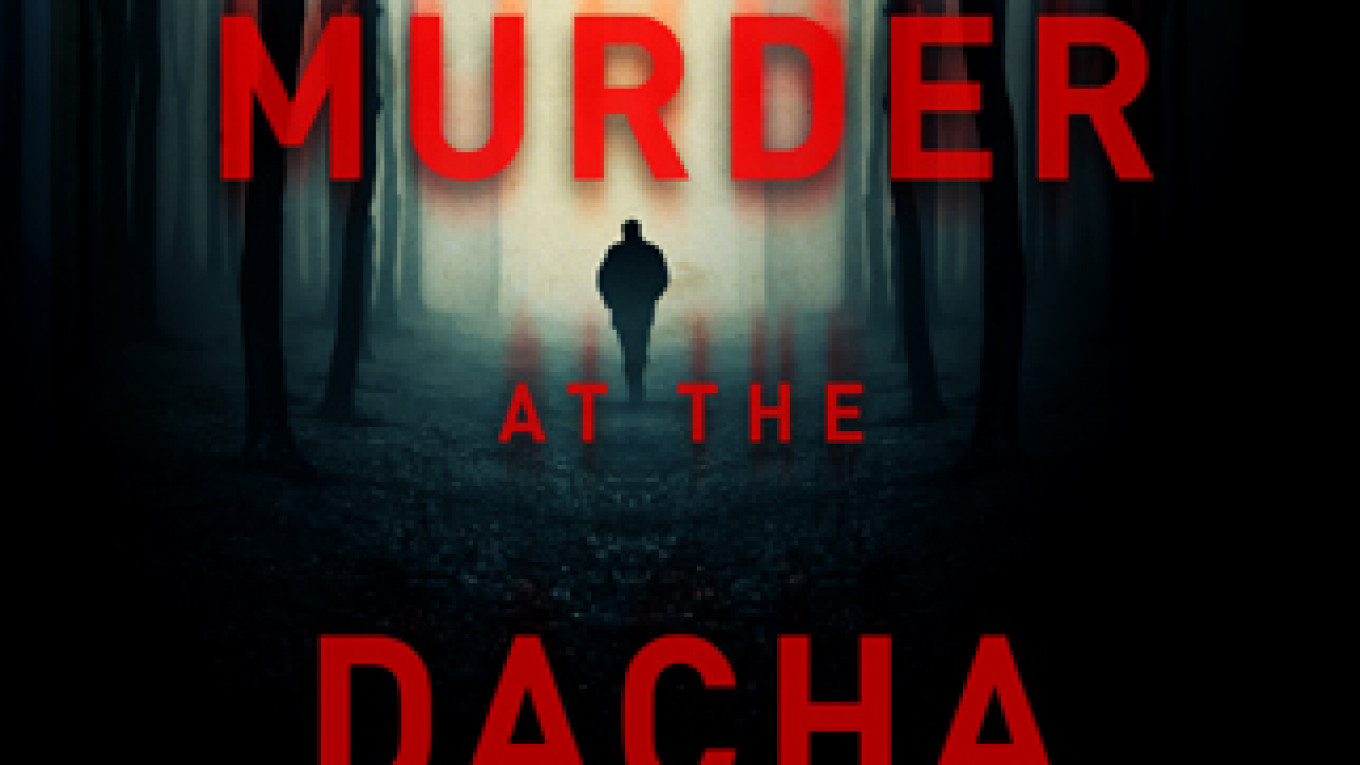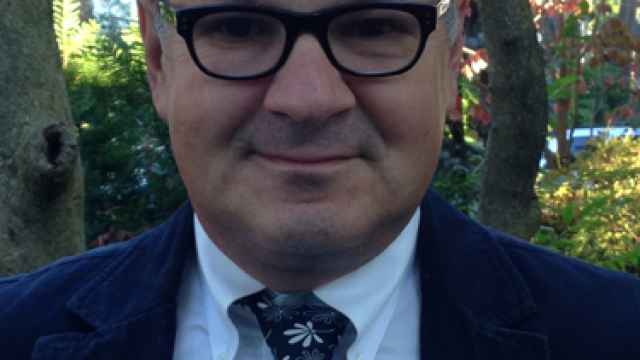"Murder at the Dacha" by Alexei Bayer is a detective thriller set in 1960s Moscow, the Moscow that New York-based Bayer grew up in. The novel features policeman Pavel Matyushkin, who gets caught up in an infamous hard currency case. Matyushkin's honesty had one publisher convinced that Bayer was writing a parody. The novel is Bayer's first and he is currently writing a prequel, which is out this spring.
I stood in the aisle, blocking his way. He stopped very close to me — a little too close for comfort.
"Come on, a--hole," he said in the same soft, weary voice. "Get out of the way."
I was starting to get used to being insulted on this train. I remained silent and didn't move.
"What the f-ck, man? Are you deaf?"
"No," I replied. "My hearing has always been very good."
"What's your problem then?"
When his voice rose, it got higher-pitched, suddenly taking on the hysterical tone of a career criminal.
I shrugged, as if to say that I wasn't quite sure myself.
"Very well then," he said. "You've asked for it."
He calmed down just as quickly as he had worked himself up. He looked like he had made a decision. He had had enough talk and was going to start acting. His right hand slipped into the pocket of his overcoat and came out again, empty but for a gleaming millimeter of straight razor squeezed between his thumb and forefinger.
The pink cardigan was surprisingly observant. This time she didn't shriek, but threw up her hands and whispered, "Oh my God. There's going to be a murder."
I don't think he was going to slash me right then and there, with so many people present. His intention was to frighten me enough to get me out of his way, and to encourage others on the train to stay out of it. But I have an aversion for straight razors. I've seen what damage they can do a person's face and neck. I shielded myself with my left arm, just in case, jumped as high as I could — he had an inch or two on me — and, throwing my head back and then bringing it sharply forward, head-butted him in the face. I felt a slight resistance just before his septal cartilage gave way, and then my forehead hit soft tissue. Something cracked, making a dull, sickening sound.
He sagged, blood streaming from his face, flooding his mouth and chin and dribbling down his shirt and onto his tweed overcoat in a narrow red rivulet. It gathered at his feet in a rapidly spreading dark puddle.
"Oh, my God," the pink cardigan said again. "They're going to kill each other. Men, comrades, what are you doing, sitting around like this? Get a move on!"
At last the men and comrades came to life. Several jumped up from their seats and rushed at the tall man, who was now sitting on the floor, his back against a bench. I pulled the razor from his grasp and, just as I did, a heavy-set citizen fell on top of him, pressing him down with the weight of his body and speaking hoarsely into his ear, "You goddamn thug, you'd better watch out."
"Get the police, shouted another passenger from his seat. "Let the cops deal with him."
I pushed the heavy-set citizen off the man and told the others to stop kicking him.
"I'm the police," I announced. "I'm Senior Lieutenant Pavel Matyushkin, Moscow Criminal Investigations. Do we have any witnesses?"
I pointed to the heavy-set citizen.
"You for instance? Are you a witness?"
"Yes, of course," the pink cardigan butted in, not waiting to be called. "I saw everything, Comrade Officer. When it started. I saw how he pulled a knife on you. He scared me so badly, I'm still sweating. Such a nice-looking young woman, too. The moment she got on the train, he sat down right across from her and started harassing her. A sex maniac, I'm sure. She'll tell you it's true. Won't you, my dear?"
She turned to where the young woman in a polka dot headscarf had been sitting. But her seat was now empty. At the other end of the car, the sliding doors slid shut.
"I see," I said, trying to catch sight of the female figure. Other heads turned after her, too. All I could see was the polka dot headscarf bobbing up and down as she moved into the next car.
"Never mind," I said, shaking my head and turning to the problem at hand.
"We'll be getting off at the next stop. Somebody will need to help me pull our friend from the car. I don't think we should let him walk on his own. Please, comrades, no punching or kicking. We're Soviet citizens, after all, not Americans. We don't kick a man when he's down."
I finished up quickly at the police station in tiny Pokrovskaya. The pink cardigan and the heavy-set passenger both got off the train with us, then made and signed their statements. A local cop said he'd drive them to the first metro stop in the city. The perpetrator, who by then had come to, was to spend the night in lockup, possibly to be followed by a few additional nights, if they decided to slap him with a 15-day administrative detention for possession of a straight razor.
Sevya, Tosya and I returned to the station to wait for the next train.
It was going to be a long wait. Pokrovskaya was a small village being swallowed up by the spreading metropolis. Several suburban trains rushed past on their way to Moscow without slowing down.
The wind had picked up, chasing shapeless clouds over the black, moonless sky. An accordion played behind the tall fence around the station and discordant female voices broke into a song about a sailor on leave to his hometown. The lyrics warned the local beauties to stay away from him, and Tosya, who sat on a platform bench next to me, elbowed me gently in the ribs.
"Look at our senior lieutenant here," she said to Sevka in mock admiration. "A real hero. Caught a dangerous criminal, didn't he?"
Sevka sat at the other end of the bench holding his fishing rod. Poor guy, he was tired and sleepy, shivering and jerking his head now and again to stay awake. He started and asked, "Why didn't you punch him, Uncle Pavel? Just to make sure he got the message?"
"Punch who?" I asked.
"The dangerous criminal."
"He was already down."
"So what?"
"Should I have punched him while he was out for the count?"
"Why not? I would. He's a dangerous criminal. I would have really socked him one in the eye."
"I think you're getting carried away," I said. Socking a person in the eye should be an extreme measure. Otherwise, it's counterproductive.
Sevka said nothing, but he seemed skeptical. Never mind, I thought. He'll get it when he gets older.
"Murder at the Dacha" by Alexei Bayer is published by Russian Information Services and available on Amazon.
Contact the author at [email protected]
A Message from The Moscow Times:
Dear readers,
We are facing unprecedented challenges. Russia's Prosecutor General's Office has designated The Moscow Times as an "undesirable" organization, criminalizing our work and putting our staff at risk of prosecution. This follows our earlier unjust labeling as a "foreign agent."
These actions are direct attempts to silence independent journalism in Russia. The authorities claim our work "discredits the decisions of the Russian leadership." We see things differently: we strive to provide accurate, unbiased reporting on Russia.
We, the journalists of The Moscow Times, refuse to be silenced. But to continue our work, we need your help.
Your support, no matter how small, makes a world of difference. If you can, please support us monthly starting from just $2. It's quick to set up, and every contribution makes a significant impact.
By supporting The Moscow Times, you're defending open, independent journalism in the face of repression. Thank you for standing with us.
Remind me later.






